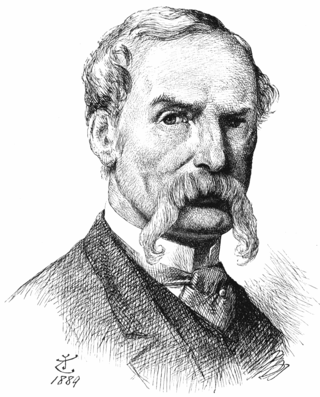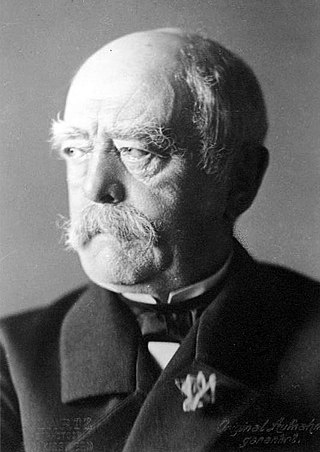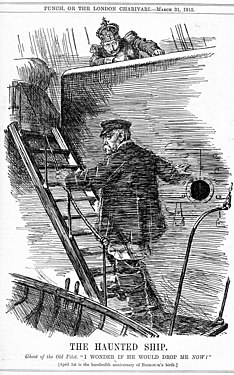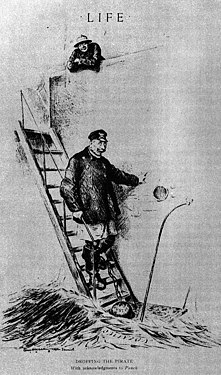
A cartoon is a type of visual art that is typically drawn, frequently animated, in an unrealistic or semi-realistic style. The specific meaning has evolved, but the modern usage usually refers to either: an image or series of images intended for satire, caricature, or humor; or a motion picture that relies on a sequence of illustrations for its animation. Someone who creates cartoons in the first sense is called a cartoonist, and in the second sense they are usually called an animator.

The German Empire, also referred to as Imperial Germany, the Second Reich, or simply Germany, was the period of the German Reich from the unification of Germany in 1871 until the November Revolution in 1918, when the German Reich changed its form of government from a monarchy to a republic.

Gilbert Arthur à Beckett was an English writer.

Sir John Tenniel was an English illustrator, graphic humourist and political cartoonist prominent in the second half of the 19th century. An alumnus of the Royal Academy of Arts in London, he was knighted for artistic achievements in 1893, the first such honour ever bestowed on an illustrator or cartoonist.

Otto, Prince of Bismarck, Count of Bismarck-Schönhausen, Duke of Lauenburg, born Otto Eduard Leopold von Bismarck, was a Prussian and later German statesman and diplomat. From his origins in the upper class of Junker landowners, Bismarck rose rapidly in Prussian politics, and from 1862 to 1890 he was the minister president and foreign minister of Prussia. Before his rise to the executive, he was the Prussian ambassador to Russia and France and served in both houses of the Prussian parliament. He masterminded the unification of Germany in 1871, and served as the first chancellor of the German Empire until 1890, in which capacity he dominated European affairs. He had served as chancellor of the North German Confederation from 1867 to 1871, alongside his responsibilities in the Kingdom of Prussia. He cooperated with King Wilhelm I of Prussia to unify the various German states, a partnership that would last for the rest of Wilhelm's life. The King granted Bismarck the titles of Count of Bismarck-Schönhausen in 1865 and Prince of Bismarck in 1871. Bismarck provoked three short, decisive wars against Denmark, Austria, and France. Following the victory against Austria, he abolished the supranational German Confederation and instead formed the North German Confederation as the first German national state, aligning the smaller North German states behind Prussia, while excluding Austria. Receiving the support of the independent South German states in the Confederation's defeat of France, he formed the German Empire – which also excluded Austria – and united Germany.

Wilhelm II or William II was the last German emperor and king of Prussia from 15 June 1888 until his abdication on 9 November 1918. Despite strengthening the German Empire's position as a great power by building a powerful navy, his tactless public statements and erratic foreign policy greatly antagonized the international community and are considered by many to be one of the underlying causes of World War I. When the German war effort collapsed after a series of crushing defeats on the Western Front in 1918, he was forced to abdicate, thereby marking the end of the German Empire and the House of Hohenzollern's 300-year reign in Prussia and 500-year reign in Brandenburg.

Steven William Maclean Bell is an English political cartoonist, whose work appears in The Guardian and other publications. He is known for his left-wing views.

A political cartoon, a form of editorial cartoon, is a cartoon graphic with caricatures of public figures, expressing the artist's opinion. An artist who writes and draws such images is known as an editorial cartoonist. They typically combine artistic skill, hyperbole and satire in order to either question authority or draw attention to corruption, political violence and other social ills.

Georg Leo Graf von Caprivi de Caprara de Montecuccoli was a German general and statesman who served as the chancellor of the German Empire from March 1890 to October 1894. Caprivi promoted industrial and commercial development, and concluded numerous bilateral treaties for reduction of tariff barriers. However, this movement toward free trade angered the conservative agrarian interests, especially the Junkers. He promised educational reforms to the Catholic Center party which would increase their influence, but failed to deliver. As part of Kaiser Wilhelm's "new course" in foreign policy, Caprivi abandoned Bismarck's military, economic, and ideological cooperation with the Russian Empire, which historians consider a major mistake. Even worse, Caprivi misjudged multiple opportunities to open good relations with the United Kingdom of Great Britain and Ireland. Frustrated, Britain turned to the Empire of Japan and the French Third Republic for agreements. Caprivi's downfall came with trade agreements that favored German industry and urban workers over more powerful agricultural interests. Historians praise his refusal to renew the harsh restrictions on socialists, and his success in the reorganization of the German military.

Bernhard Heinrich Karl Martin, Prince of Bülow was a German statesman who served as the foreign minister for three years and then as the chancellor of the German Empire from 1900 to 1909. A fervent supporter of Weltpolitik, Bülow single-mindedly devoted his chancellorship to making Germany a leading power on the world stage. Despite presiding over sustained economic growth and technological advancement within his country, his government's foreign policy did much to antagonize the international community and significantly contributed to the outbreak of the First World War.

Nikolaus Heinrich Ferdinand Herbert, Prince of Bismarck was a German politician, who served as Foreign Secretary from 1886 to 1890. His political career was closely tied to that of his father, Otto von Bismarck, and he left office a few days after his father's dismissal. He succeeded his father as the 2nd Prince of Bismarck in 1898. He was born in Berlin and died in Friedrichsruh.

Augusta Viktoria of Schleswig-Holstein was the last German Empress and Queen of Prussia by marriage to Wilhelm II, German Emperor.

Martin Rowson is a British editorial cartoonist and writer. His genre is political satire and his style is scathing and graphic. He characterises his work as "visual journalism". His cartoons appear frequently in The Guardian and the Daily Mirror. He also contributes freelance cartoons to other publications, such as Tribune, Index on Censorship and the Morning Star. He is chair of the British Cartoonists' Association.

The Anti-Socialist Laws or Socialist Laws were a series of acts of the parliament of the German Empire, the first of which was passed on 19 October 1878 by the Reichstag lasting until 31 March 1881 and extended four times.

The House of Bismarck is a German noble family that rose to prominence in the 19th century, largely through the achievements of the statesman Otto von Bismarck. He was granted a hereditary comital title in 1865, the hereditary title of Prince of Bismarck in 1871, and the non-hereditary title of Duke of Lauenburg in 1890. Several of Otto von Bismarck's descendants, notably his elder son Herbert, Prince of Bismarck, have also been politicians.

The Wilhelmine Period comprises the period of German history between 1890 and 1918, embracing the reign of Kaiser Wilhelm II in the German Empire from the resignation of Chancellor Otto von Bismarck until the end of World War I and Wilhelm's abdication during the November Revolution. It affected the society, politics, culture, art and architecture of Germany and roughly coincided with the Belle Époque era of Western Europe.

Count Wilhelm Otto Albrecht von Bismarck-Schönhausen was a German counselor, civil servant and politician, who served as a member of the Reichstag from 1880 to 1881 and president of the Regency of Hanover from 1889 to 1890. The youngest son of Otto von Bismarck, he and his brother Herbert von Bismarck both resigned their posts after the elder Bismarck was dismissed as Chancellor of Germany in 1890. Wilhelm subsequently accepted an appointment as Governor of East Prussia in 1894. Mount Wilhelm is the highest mountain in Papua New Guinea at 4,509 metres, part of the Bismarck Range, was named after him by Hugo Zöller.

The Young Cartoonist of the Year Award is an annual award given by the Cartoon Museum in London in association with the British Cartoonists' Association to the best young cartoonist, in the category of Under 18 and Under 30.
The Cartoon Art Trust is a charity founded in 1989 in the United Kingdom, which acts as the owner and operator of the London Cartoon Museum, and also runs the Cartoon Art Trust Awards. Its chairman is the cartoonist Oliver Preston.





















